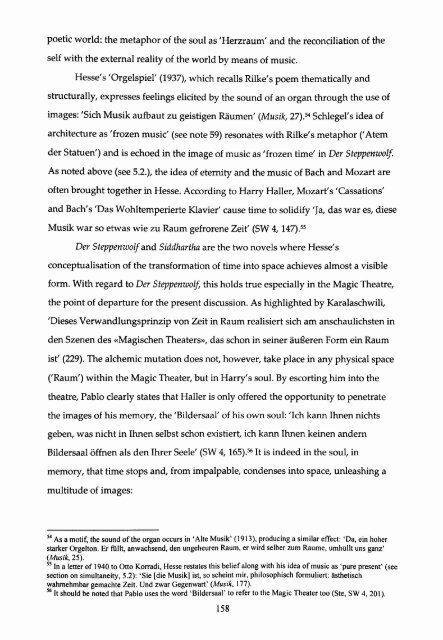HERMANN HESSE AND THE DIALECTICS OF TIME Salvatore C. P. ...
HERMANN HESSE AND THE DIALECTICS OF TIME Salvatore C. P. ...
HERMANN HESSE AND THE DIALECTICS OF TIME Salvatore C. P. ...
Create successful ePaper yourself
Turn your PDF publications into a flip-book with our unique Google optimized e-Paper software.
poetic world: the metaphor of the soul as 'Herzraum' and the reconciliation of the<br />
self with the external reality of the world by means of music.<br />
Hesse's 'Orgelspiel' (1937), which recalls Rilke's poem thematically and<br />
structurally, expresses feelings elicited by the sound of an organ through the use of<br />
images: 'Sich Musik aufbaut zu geistigen Raumen' (Musik, 27). 54 Schlegel's idea of<br />
architecture as 'frozen music' (see note 59) resonates with Rilke's metaphor ('Atem<br />
der Statuen') and is echoed in the image of music as 'frozen time' in Der Steppenwolf.<br />
As noted above (see 5.2.), the idea of eternity and the music of Bach and Mozart are<br />
often brought together in Hesse. According to Harry Haller, Mozart's 'Cassations'<br />
and Bach's 'Das Wohltemperierte Klavier' cause time to solidify 'Ja, das war es, diese<br />
Musik war so etwas wie zu Raum gefrorene Zeit' (SW 4,147). 55<br />
Der Steppenwolf and Siddhartha are the two novels where Hesse's<br />
conceptualisation of the transformation of time into space achieves almost a visible<br />
form. With regard to Der Steppenwolf, this holds true especially in the Magic Theatre,<br />
the point of departure for the present discussion. As highlighted by Karalaschwili,<br />
'Dieses Verwandlungsprinzip von Zeit in Raum realisiert sich am anschaulichsten in<br />
den Szenen des «Magischen Theaters», das schon in seiner aufieren Form ein Raum<br />
ist' (229). The alchemic mutation does not, however, take place in any physical space<br />
('Raum') within the Magic Theater, but in Harry's soul. By escorting him into the<br />
theatre, Pablo clearly states that Haller is only offered the opportunity to penetrate<br />
the images of his memory, the 'Bildersaal' of his own soul: 'Ich kann Ihnen nichts<br />
geben, was nicht in Ihnen selbst schon existiert, ich kann Ihnen keinen andern<br />
Bildersaal offnen als den Ihrer Seele' (SW 4,165). 56 It is indeed in the soul, in<br />
memory, that time stops and, from impalpable, condenses into space, unleashing a<br />
multitude of images:<br />
54 As a motif, the sound of the organ occurs in 'Alte Musik' (1913), producing a similar effect: 'Da, ein hoher<br />
starker Orgelton. Er fullt, anwachsend, den ungeheuren Raum, er wird selber zum Raume, umhullt uns ganz'<br />
(Musik, 25).<br />
55 In a letter of 1940 to Otto Korradi, Hesse restates this belief along with his idea of music as 'pure present' (see<br />
section on simultaneity, 5.2): 'Sie [die Musik] ist, so scheint mir, philosophisch formuliert: asthetisch<br />
wahrnehmbar gemachte Zeit. Und zwar Gegenwart' (Musik, 177).<br />
56 It should be noted that Pablo uses the word 'Bildersaal' to refer to the Magic Theater too (Ste, SW 4, 201).<br />
158
















